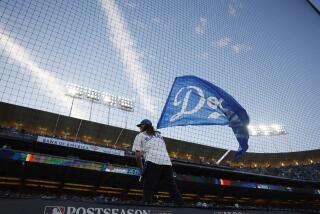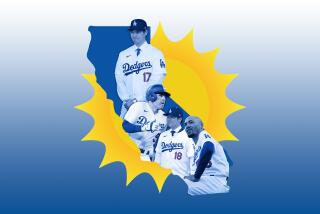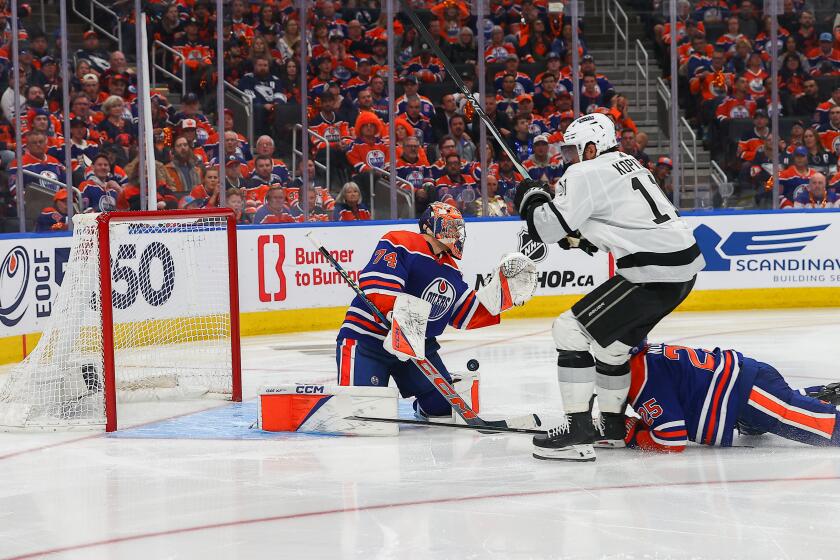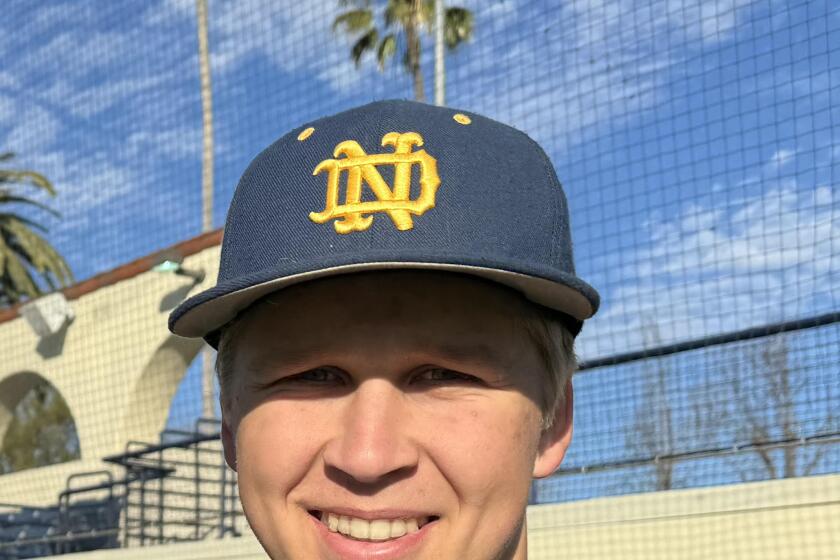With adults involved, youth baseball can be more than child’s play
This was supposed to be Rancho San Diego’s year, the summer its league reached youth baseball’s mecca, the Little League World Series.
The majority of its major division All-Star team — consisting of players 12 years old or younger as of April 30 of this year — had won consecutive state titles in younger age groups the previous two years.
The next step on the Little League ladder was expected to come in a leap, those same talented and now playoff-tested boys poised to shine under the lights of large, filled stadiums and in the glare of cameras beaming their games to a national television audience.
Early on, Rancho San Diego looked as good as advertised. The Dawgs, as they called themselves, dominated in their opening games.
But it wasn’t long after that when those best-laid plans were derailed.
A Little League investigation determined that two Rancho San Diego players — new boys to the league who hit third and fourth in the batting order — were ineligible because of residency issues.
Just like that, those players were disqualified, a tournament win was forfeited, and what was left of the team lost in a district championship game, bringing what was supposed to be a dream season to an abrupt end.
Ocean View Little League of Huntington Beach, not Rancho San Diego, will represent the United States West Region when 16 teams from around the world converge on Williamsport, Pa., this week to compete for youth baseball’s biggest prize.
The Little League World Series is an annual 11-day spectacle surrounding games that will be played on pristine fields and before major league-sized crowds, a showcase for all that’s good with the world’s largest youth sports organization.
That’s the hope, anyway.
Occasionally, controversies such as Rancho San Diego’s dull the shimmer. In spite of the altruistic opening clause in the Little League’s “Parent/Volunteer Pledge,” which instructs adults to “teach all children to play fair and do their best,” overzealous adults don’t always play by the rules.
Observers would say Pulitzer Prize-winning author James A. Michener had it right in his 1976 book “Sports in America” when he wrote, “The evil always begins with adults who desperately want to win championships that were denied them when they were young boys. They use children, often not their own, to achieve this dream, and in doing so pervert the normal experiences of youth.”
Marty Hoy, administrator for California District 25, which oversees Little League teams from Beverly Hills, Culver City, Los Angeles, Malibu and Santa Monica, noted that “99% of our rules are there to protect children” from adults whose desire to win can become maniacal.
It still happens, though.
In the 1970s, whispers about overage Asian participants grew to shouts when over a three-year stretch Taiwan outscored U.S. teams, 120-2, in a span of nine Little League World Series games.
The Americans fumed with such gusto that Peter McGovern, then Little League’s chairman, finally buckled under the weight of an avalanche of complaints, banning international competition and making the 1975 LLWS an all-American tournament.
The ban was lifted the following year, but only after investigators sent to Taiwan were unable to turn up evidence of cheating.
In 1992, a team from the Philippines rolled to the championship but later had its title stripped when it was discovered that ineligible players — some too old, some from out of the area — were on the roster.
“We were so young and naive, we figured everyone was playing by the rules,” said Sean Burroughs, the star of the U.S. champion Long Beach team that lost to the Philippines in the International championship game, and is now recognized as the 1992 champion. Burroughs now plays for the Arizona Diamondbacks.
In 2001, a sensational pitcher from New York City named Danny Almonte led his team to a third-place LLWS finish, not giving up an earned run in three Williamsport appearances and throwing the series’ first perfect game in 44 years.
The story — star pitcher lifts hardscrabble Bronx kids into the record books — seemed too good to be true. And it was — Almonte, who was born in the Dominican Republic in 1987, was too old to be eligible. He was 14, not 12, as the birth certificate on file with Little League stated.
Every pitch he threw and every game his team won was scrubbed from the record books, and Little League clamped down with stricter policies. Teams are now required to keep with them reams of documents proving their players meet age and residency requirements.
Last month, the Rev. John Foundation Little League team from Uganda, the first from Africa to qualify for the LLWS, was ejected from the tournament after the State Department denied at least some of the team’s visa applications. Little League International said in a statement that it had been told by the State Department that documentation provided by the team contained discrepancies.
Most of the fact-checking Little League does occurs at the local level because the organization, beyond its thousands of volunteers, lacks manpower. There are nearly 7,500 Little League baseball and softball leagues worldwide — more than 6,500 in the U.S. — yet the organization doesn’t have a full-time investigator among its 110 employees.
A 10-person tournament committee headed by Patrick Wilson, vice president of operations for Little League International, makes the final determination when issues reach the highest level.
Wilson’s group handled the Rancho San Diego case, which had been brewing since January, long before the first pitch of Little League’s regular season.
Donnie Young, president of Rancho San Diego Little League, said it started with an anonymous letter that alleged three top players — “ringers” from outside the boundaries — were planning to join the league.
Young said his league gathered information on the boys but determined no rules had been broken. The Little League tournament committee got involved because of what Young said was a heavy “volume of complaints” following the league All-Star team’s first couple of blowout wins.
“The way the culture is, if somebody’s better than your kid, the people who have the inferior kid — they’re going to say you’re cheating,” Young said. “That’s what happened.”
And in this case they were right, according to the tournament committee.
Wilson, the Little League executive, said two of the players violated rules by moving into the area solely for the purpose of playing for the team.
Of course, scrutiny of exceptional teams and players has always existed, and a fireballing pitcher or home run-slugging hitter who is 6 feet tall or has a dash of stubble are often hastily declared suspect by adults from opposing teams.
“Those comments will always come out in humor, but there’s always some meaning behind it as well,” said Donnie Button, manager of the Red Bluff (Calif.) Little League All-Star team that lost in the West Regional final to Ocean View.
“It’s really performance-based, performance-driven,” Button said. “Parents are always looking at scholarships, the next level, the next situation.”
Bill Moore, a performance psychologist who has worked with dozens of athletes, said the old “go out and have fun” adage is now stained in irony.
“It really is a mixed message,” Moore said, “because the kid knows the huge investment that’s being made, time-wise, money-wise, emotionally-wise.”
Keeping the game fun is something Button said he strives to do each game, whether joking with players or just reminding them to enjoy themselves.
But as California district administrator Hoy said, that’s a message that should also apply to the adults involved.
The problem, Hoy said: “We want the best for our kids. But we don’t just want a little bit.
“We want them to go all the way.”
twitter.com/baxterholmes
More to Read
Get our high school sports newsletter
Prep Rally is devoted to the SoCal high school sports experience, bringing you scores, stories and a behind-the-scenes look at what makes prep sports so popular.
You may occasionally receive promotional content from the Los Angeles Times.






